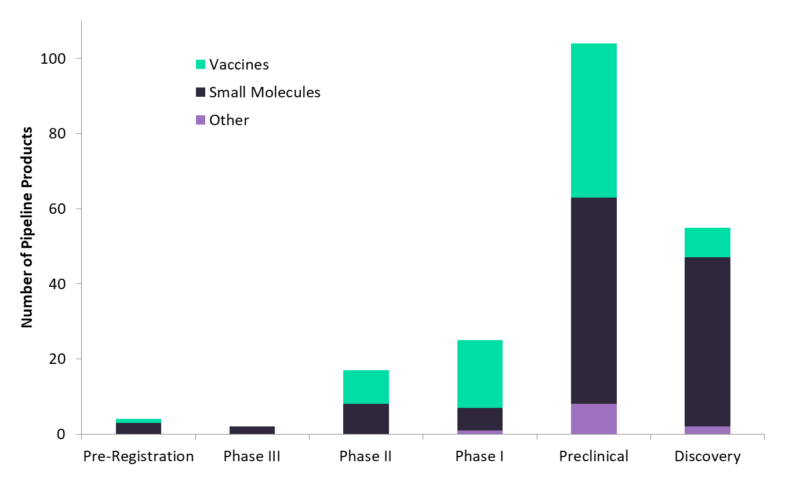On 25 April, the World Health Organization (WHO) member states celebrate World Malaria Day. This year’s theme, ‘Ready to Beat Malaria’, highlights the collective goal of the global malaria community – a malaria-free world. With an estimated 216 million cases of malaria occurring across 91 countries in 2016, halting transmission of the malaria parasite is a critical step to achieving this goal.
An international effort is required to finance the R&D product development and public health administration necessary to block transmission and achieve disease eradication. The Global Fund for AIDS, Tuberculosis and Malaria; the US President’s Malaria Initiative; and other country-level bilateral and multilateral entities support these efforts. Alongside academic institutions and pharmaceutical companies, these stakeholders are largely responsible for a strong malaria R&D pipeline, as depicted in Figure 1.
Figure 1: malaria pipeline, 2018

Source: GlobalData, Pharma Intelligence Center [Accessed April 20, 2018] © GlobalData
Malaria is a life-threatening parasitic disease that is spread by mosquitoes and has plagued humans since the dawn of time. The previous global eradication campaign from the 1950s–1960s resulted in disease elimination in some countries, but drug and insecticide resistance have contributed to undermining those efforts.
Today, malaria’s burden is highest in countries classified by the World Bank as low-to-middle income nations, including countries in the WHO Africa region, which carries 90% of the global malaria burden, and the WHO SouthEast region, which carries 7% of global malaria burden. The concerns of drug and insecticide resistance persist, with the WHO admitting that current tools and methods are inadequate for achieving eradication of the disease.

US Tariffs are shifting - will you react or anticipate?
Don’t let policy changes catch you off guard. Stay proactive with real-time data and expert analysis.
By GlobalDataDespite these obstacles, there are reasons to remain hopeful as the current campaign gains traction. For example, Sri Lanka was declared malaria-free in 2016. In Southern Africa, the Elimination 8 Strategic Plan (2015–2020) is focusing on eradicating malaria in eight countries (Angola, Botswana, Mozambique, Namibia, South Africa, Swaziland, Zambia, Zimbabwe), with four of these countries targeting malaria elimination by 2020, according to the WHO.
With promising infection and transmission-blocking malaria vaccines in the R&D pipeline as well as public-private partnerships (PPPs) advancing novel mosquito control tools – such as new classes of insecticides, and microbiological (Wolbachia, Chromobacterium Panama [Csp_P]) and genetic (sterile male) approaches to controlling mosquito populations – GlobalData anticipates that malaria eradication will begin to become a realistic goal in the next 10–15 years.
Related reports
GlobalData (2018). Malaria – Opportunity Analysis and Forecasts to 2026, to be published
GlobalData (2018). Expert Insight: To Help Eradicate Neglected Tropical Diseases, Pharma Must Juggle ROI Concerns and Social Responsibility, February 2018, GDHC1590EI
GlobalData (2018). Expert Insight: Sanofi’s Woes in Dengue Continue, Opening the Door for Rival Takeda, January 2018, GDHC1578EI
GlobalData (2017). Expert Insight: Biological Warfare: Could Bacteria Be the Answer to Curtailing Arbovirus Transmission?, October 2017, GDHC1424EI
For more insight and data, visit the GlobalData Report Store – Pharmaceutical Technology is part of GlobalData Plc.




